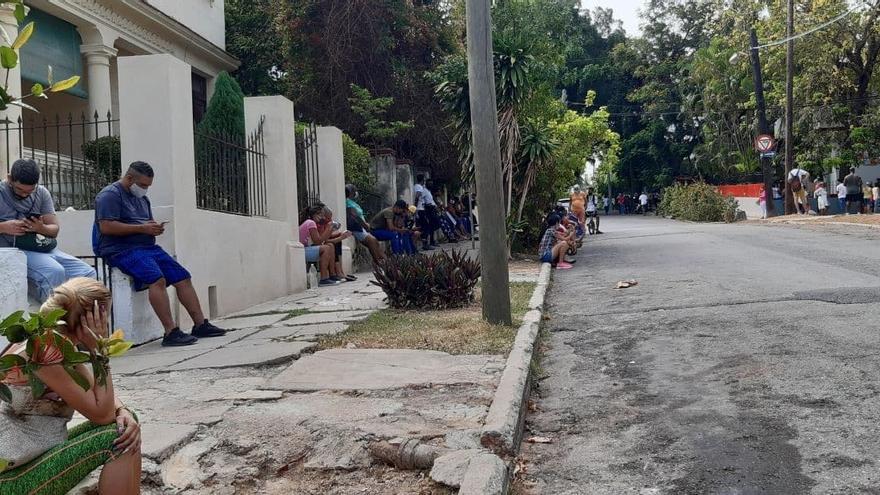
![]() 14ymedio, Natalia López Moya, Havana, 7 June 2021 — The line stretches for several blocks. There are people sitting on the sidewalk curb, others take shelter under the shade of the trees, and many others take to walking from one corner to another to stretch their legs. They joined the line at dawn, everyone has their ration book with them and they hope to buy the decoder boxes for digital television.
14ymedio, Natalia López Moya, Havana, 7 June 2021 — The line stretches for several blocks. There are people sitting on the sidewalk curb, others take shelter under the shade of the trees, and many others take to walking from one corner to another to stretch their legs. They joined the line at dawn, everyone has their ration book with them and they hope to buy the decoder boxes for digital television.
Known as “the little boxes,” the devices that allow you to enjoy a broader range of national broadcasts only appear in dribs and drabs in some state stores and for weeks it has been mandatory to present their rationbook to acquire them. Only residents of the same municipality are entitled to buy in these places.
“My sister-in-law called me at five in the morning, just to tell me they lifted the curfew,” a woman tells this newspaper, while waiting about 200 yards from the store that accepts payment in Cuban pesos at 11th and 4th street Havana’s El Vedado neighborhood. “They are worth 1,250 pesos each, but if I add up the number of hours I have been here it will cost me a fortune,” she laments after noon.
“No, it is not by the ration book but with the ration book”, clarifies an employee of a store of the Trimagen chain, managed by the Cuban military, which in recent months has sold these devices on several occasions. “We need the notebook to write down who has already bought and thus avoid hoarders and resellers,” he explains. “The problem is that there are households that have more than one television, even that there are several families in the same house and they can only buy one,” he acknowledges.
“Many people have been asking how long it takes between buying one box and being able to buy another, but they have not explained that to us yet. At the moment the data of those who have already acquired it is being archived and if anyone has doubts it must go to the provincial government,” clarifies the worker, who details that in the Trimagen store they are selling” the boxes for the municipalities of Cerro and Plaza.”
Digital television began its first steps in Cuba in 2013, but economic problems have slowed its progress. The authorities recently announced that they are preparing 318,000 Chinese standard digital TV decoders.
Until the arrival of these devices on the national scene, the word “box” was used in popular Cuban speech to designate a rectangular cardboard container where food is traditionally served at parties, cafeterias that sell to go, or situations where diners cannot sit in front of the plate.
With use, the expression “get a box” came to mean reaching something you want, taking advantage of a situation (even sexually) or being taken into account in some distribution mechanism. In April 1980, when more than 10,000 Cubans requested asylum at the Peruvian Embassy in Havana to try to escape from the Island, the phrase gained strength.
Squeezed into the embassy’s garden and on the roof of the building, in a short time the overcrowding of these thousands of people also turned into a humanitarian crisis that the ruling party skillfully handled. The distribution of the “boxes” with food became a moment of fights that the government cameras filmed to present those gathered there as criminals. “To get a box, you had to go over the top of others and beat each other with your fists,” one of those refugees would later recall.
Now, to get a box you need long hours in line, a large amount of money in your pocket and a ration book. Instead of food or a piece of birthday cake , you receive the right to be able to watch official television with better quality.
____________
COLLABORATE WITH OUR WORK: The 14ymedio team is committed to practicing serious journalism that reflects Cuba’s reality in all its depth. Thank you for joining us on this long journey. We invite you to continue supporting us by becoming a member of 14ymedio now. Together we can continue transforming journalism in Cuba.
